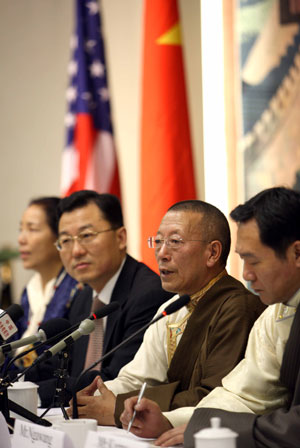| The unique culture of the Tibetan people is well preserved in China and the claims that the Tibetan culture is nearing extinction are simply not true, a living Buddha of Tibetan Buddhism said here Tuesday.
"In old Tibet, 95 percent of Tibetans were illiterate. Now the illiteracy rate has dropped significantly, as almost all school-age children in Tibet have access to education with subsidies from the government," Shingtsa Tenzinchodrak, a living Buddha of the Kagyu sect, told a press conference.
 |
|
The Tibetan delegation of the National People's Congress, China's top legislature, holds a press conference in Washington, the United States, on March 17, 2009. (Xinhua Photo) |
All schools in Tibet have bilingual education in Tibetan and Chinese, said Shingtsa Tenzinchodrak, adding that some of the schools also teach English.
Shingtsa Tenzinchodrak is in the United States for a visit as the head of a five-member delegation of the Tibetan NPC deputies. Their visit is seen by many as a positive way to help improve American people's understanding of Tibet.
"The Tibet culture is not nearing extinction as the Dalai Lama clique has claimed. On the contrary, it is developing," said Shingtsa Tenzinchodrak, also a deputy of the National People's Congress (NPC), China's parliament.
The living Buddha said it was a privilege of the nobility and the small number of monks to learn the proper Tibetan language, whereas serfs and slaves, who accounted for 95 percent of the total population at the time, had no right to education.
"If there is indeed (cultural) extinction, it is the extinction of the 'traditional culture' of the feudal lords represented by the Dalai Lama," he said.
Before the theocratic feudal serfdom was abolished in Tibet in 1959, most of Tibet's natural and social resources had been monopolized by three of the largest feudal lords, officials of the old Tibetan government, the nobility and the monasteries.
Asked to comment on the Dalai Lama, Shingtsa Tenzinchodrak said the Dalai Lama should not be judged only by what he has said. "We also need to see what he has done over the past decades," he said.
"The Dalai Lama is not a simple religious figure . He is rather a political figure," he said.
He also said it is not proper to call the Dalai Lama the "religious leader" of Tibet because there are many other religious sects in Tibet in addition to the Gelug sect to which the Dalai Lama belongs.
Lanny Davis, who served as special counsel to President Bill Clinton from 1996 to 1998, said a complete lack of information has led the American people, including himself, to the incorrect impression about what the facts are about Tibet.
"It's good time to bring more Tibetans over and have fellow Americans sitting beside them to help get the facts out about Tibet," he said.
(Xinhua News Agency March 18, 2009) | 